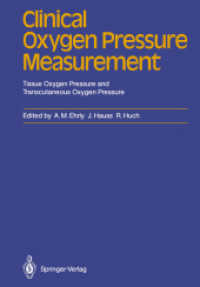- ホーム
- > 洋書
- > 英文書
- > History / World
Full Description
When a process popularly known as the Industrial Revolution first took hold in Germany in the mid-nineteenth century, many contemporaries were stunned by the scale and ferocity of the transformation. While Germany had long been considered a promising place to industrialize, given its historic ties to New World markets, skilled and educated workforce, and deep pockets of wealth, progress had been slow due to persistent indifference and skepticism across society. That people should have suddenly dropped their reservations and simply embraced the new industrial modernity defied all explanation. Grasping for answers, some concluded that the Germans must have fallen under the spell of the "capitalist spirit."
Benjamin P. Hein locates the impetus for the abrupt transformation of German society after ca. 1850 in its cultural exchange with the country's burgeoning diaspora in North America, one of the largest in this century. In correspondence and other "news from America," the emigrants conveyed to their families, communities, and business associates in Europe a different set of norms and ethics regarding work, entrepreneurship, and commerce. By making it socially acceptable and politically meaningful to frequently change professions or to organize businesses as joint-stock corporations, they inadvertently mobilized an otherwise reluctant population for a more centralized regime of production that served global market forces instead of local needs and corporatist norms. They also helped popularize key institutional pillars of the new economy, like the universal bank, and inspired innovative commercial reforms, most notably the "limited liability partnership" (LLP), or "G.m.b.H." in German, which became the legal foundation of Germany's particularly robust small-business economy.
While addressing global trends, The Migrant's Spirit makes these phenomena comprehensible through the lives of individuals who faced painful choices and moral quandaries as they attempted to navigate a new social and economic order and began to trust countrymen abroad over local sources of guidance. By reconstructing their struggles, Hein sheds new light on the transatlantic dimensions of Germany's path to industrial modernity.
Contents
Acknowledgments
Note on Translations
Preface
Introduction: The Migrant's Spirit
Chapter 1: Württemberg, 1817
Chapter 2: New Transatlantic Connections
Chapter 3: Struggles with Impudence
Chapter 4: The Home
Chapter 5: Nation, Incorporated
Chapter 6: The Idea of Deutsche Bank
Chapter 7: Migration Backed Securities
Chapter 8: Reckoning with the Migrant's Spirit
Epilogue: Forgetting America
Notes
Bibliography
Index








